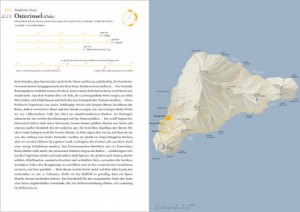Travel book review: Atlas of Remote Islands
Do not be fooled. At first sight it is a beauty, appearing like an old-time adventurer’s tale, from the font to the pretty gray island illustrations. But this retro-styled book is a Pandora’s box, depressingly morose, almost void of sunny skies and palm trees. The theme is desperation and hopelessness, expressed through troubling tales. The book pairs beautifully illustrated close-up maps of fifty different exotic islands along with a short usually-tragic story about each, which the author promises are true. These are tales of starvation, sailors surviving on meager rats and brine-soaked leather. These are tales of plane crashes and H-bombs. Tales of prisoners exiled to a dim thule. There is sex abuse and cannibalism. Even when the majesty of nature is mentioned, it is often as the perpetrator of a crime, like the birds that swarmed and devoured a midshipman alive on Macquarie Island.
There are only a few uplifting stories, my favorite tells of a six-year old boy in France, who wakes speaking a language from his dreams. At age 33, he is sought by university researchers who try for two years to identify this language. When he is directed to a Polynesian divorcee, they can converse in Rapa, the rare Polynesian language the man miraculously acquired. They marry and move in 1983 to this remote island. But to sample the rest of the stories is to prepare for a month of nightmares: “bleeding paws of the sled dogs,” “anything better than to stay trapped on a patch of sand,” “buried alive by a landslide,” “he rapes and kills,” and “the newborn is laid on his face to suffocate.”
As is common, travel magazines and websites mention books to buy without having opened them. It is easy to recommend this book upon its beauty and the first few pages of the introduction, which are both brilliantly styled and disturbingly deceptive. The author remembers being a schoolchild in East Germany and embracing the maps and atlases she grew up reading, of places she would never go. “Give me an atlas over a guidebook any day,” she declares, “There is no more poetic book in the world.” But here there is only poetry in the macabre. Definitely not the feel good hit of the summer.
Overall: Pandora’s coffee table book for the disturbed.
Review of the travel book: Atlas of Remote Islands: Fifty Islands I Have Never Set Foot On and Never Will, by Judith Schalansky. Translated from the German by Christine Lo. 2009. Translation 2010. Review by Matthew Stone.


